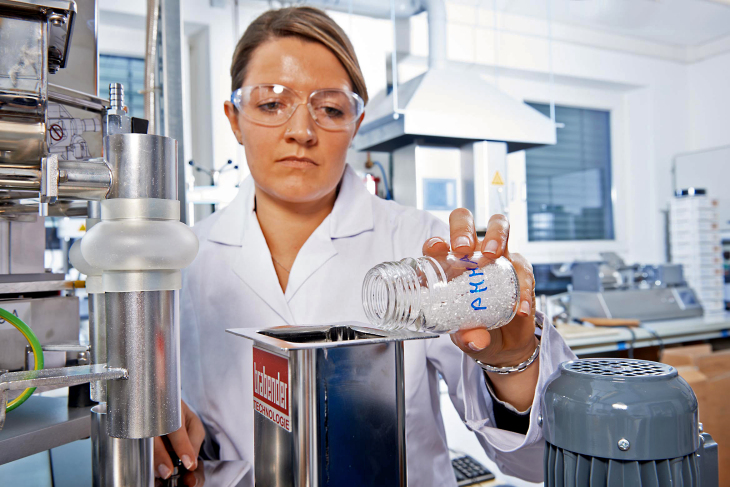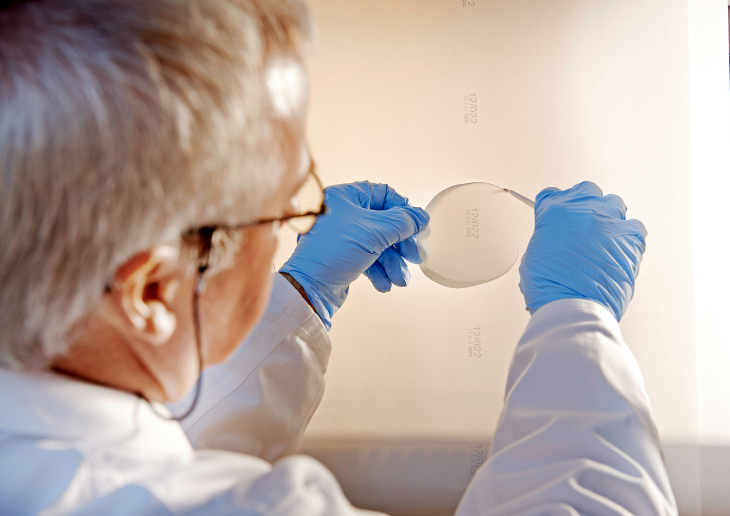Everything in Flow
"Practical Polymer Rheology” is the topic of the Geesthacht Polymer Days, held on the 18th and 19th of November 2014, at the Helmholtz-Zentrum Geesthacht (HZG). Rheology refers to the study of flow and deformation of materials. Read the interview here with the organiser and HZG Department Head Dr. Ulrich Handge. He discusses his research, the connection to rheology and the topics of the two-day workshop.

HZG researcher in the test laboratory.
Photo: HZG/ Christian Schmid
The term “polymer” stems from the Greek words “poly”, which means “many” and “méros”, which means “part”. Together they mean: “composed of many equal parts”. Why are polymers so interesting for you?
Polymers can be used industrially in incredibly diverse ways. Depending on the polymer, they possess very good properties for separation processes in membrane technology. The production of polymers is often economical. Polymers also have very good processing properties. We can produce very thin polymer membranes with a high permeability.
Which polymers are we talking about specifically?

Dr. Ulrich Handge, Head of the Department for Material Characterisation and Processing. Photo: HZG/ Christian Schmid
We study a wide range of plastics at the Institute of Polymer Research. We generally use thermoplastic polymers. What are known as block copolymers are very important to our research. They consist of different and often highly incompatible (immiscible) molecular blocks. Under suitable conditions, we can produce a porous sponge-like structure that allows us to separate mixtures of several components. On the basis of block copolymers and an extrusion method – where a polymer liquid is conveyed under pressure through a narrow annular slit die – our department has, for example, managed to spin a hollow fibre that possesses an isoporous outer skin by way of an additional precipitation process. In the future, the hollow-fibre membrane can, for example, be used to filter viruses and bacteria from drinking water. A further application could, for example, be used for medical dialysis systems.
You’ve just outlined a concrete example of development. What objectives does your department generally fulfil in connection to polymer research?
Our department deals with the characterisation and development of nanostructured polymer materials for membranes as well as the actual production of membranes. The characterisation thereby serves as an important foundation for all further development and production phases. The more I know about the properties of polymer materials, the more I can target the processing, and in doing so, I can improve the microstructures in regards to concrete applications. Rheological properties in particular play a critical role. They are fundamental to material processing.
Could you clarify the connection between rheology and material processing?
An important rheological property is the viscosity of the fluid, which describes the resistance of the material to flow. It is related to its molecular structure. Macromolecules slide off one another as they flow. The larger the chain length of the polymer, the more viscous the fluid becomes and the more energy I need to expend in processing. Energy as well as temperature are important processing parameters that I can control. We try to optimally choose these parameters to obtain each desired membrane structure.

Porosity and pore size are important parameters for membranes. Photo: HZG/ Christian Schmid
What does that look like in practice?
Porosity and pore size are important parameters for membranes. By controlling the process parameters, we can influence them. With foams, for example, the viscosity is largely responsible for the foam density, the average cell size and for other typical foam properties, such as whether it is an open or a closed-cell foam. In a widely used membrane production process, solvents are utilised in what is known as the phase inversion method. The viscosity of the polymer solution used has a substantial impact on the properties of a hollow fibre membrane. In our department, we also research production methods in which we do not use solvents.
What is the motivation for developing solvent-free processes?
The solvents must be washed from the membrane using a laborious process. In many cases, they can be harmful to one’s health. It is of benefit to the environment every time we refrain from using solvents. Furthermore, it is expensive to treat or dispose of them.
To what extent has this project become a reality?
Block copolymer foams with a low foam density can already be produced entirely without the use of solvents right from the melting process. In addition, by means of the sintering process – a processing method in which the temperatures remain below the melting temperature – we can produce functional membranes without solvents. Knowledge of the rheological property as a function of temperature and processing parameters (for example, the deformation rate on a microscopic scale) is again vital for the optimisation of these methods for those polymers used.
The Geesthacht Polymer Days take place on November 18th and 19th, 2014, for the third time, and your department is organising the conference this year. In general, what can I expect from the Polymer Days?
The Geesthacht Polymer Days have existed since 2012 and the focus changes annually. They are aimed at industry users as well as university and non-university research institutions. We are concerned with "Practical Polymer Rheology" this year because we know that understanding of flow properties is of great importance in the realm of practice. We want to share our expertise with the users on-site.
ow many participants do you expect?
We're expecting forty participants altogether, including the speakers, from all over Germany.
What should the participants expect?

The rheology workshop teaches the foundations of rheology (flow and deformation properties) and its deeper connections. Experimental measurement methods, which are very complex, are included in the information that will be highlighted. Photo: Anton Paar Germany GmbH
We wish to examine the foundations in the workshop as well as the deeper theoretical and experimental aspects of rheology. We have therefore invited experienced scientists in this field who can help us offer a comprehensive view of standard and advanced methods of practical rheology. We will initially acquaint participants with the foundations of flow properties, including important concepts and measurement methods. At the same time, we will highlight key relationships in the context of experimental studies. We will then move on to the different properties of polymer solutions and polymer melts. We will deal with experimental methods that are highly complex during the workshop.
Best of luck with your workshop and thank you for this engaging discussion.
Kontakt

Head of the Department for Material Characterisation and Processing
Institute of Polymer Research
Phone: +49 (0)4152 87-2446
Max-Planck-Str. 1
21502 Geesthacht
Press and Public Relations
Helmholtz-Zentrum Geesthacht
Phone: +49 (0)4152 87-1677
Max-Planck-Str. 1
21502 Geesthacht
